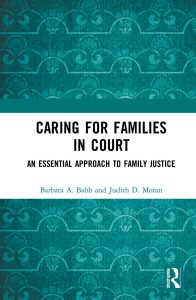Understanding the Unified Family Court’s Ecological and Therapeutic Capacities
The Sayra and Neil Meyerhoff Center for Families, Children and the Courts (CFCC) is a national leader in the movement to reform the family justice system. Our work builds upon two core principles— therapeutic jurisprudence and the ecology of human development —and our programs incorporate and promote problem-solving activities.

CFCC’s founding focus was on promoting a unified family court system in Maryland and nationally. A unified family court is a court structure and operations model that can respond to the full range of legal issues that arise in family law cases—divorce, custody, child support, domestic violence, delinquency, abuse and neglect, among others—within one court, while simultaneously addressing non-legal issues that challenge families, such as education, housing, poverty, parenting, substance use and mental health.
Therapeutic jurisprudence (TJ) is a central tenet of all of CFCC’s work and the unified family court model. TJ operates to ensure that all interventions into family problems make matters better, not worse, for families and children. For example, working with judges and court personnel in Maryland, CFCC has facilitated a mission statement for Maryland’s Family Divisions that aims “to provide a fair and efficient forum to resolve family legal matters in a problem-solving manner, with the goal of improving the lives of families and children who appear before the court.”
The ecology of human development is a theoretical paradigm from the social sciences that examines the child and family from a holistic or systems perspective, considering all of the different relationships and structures that affect a child’s life and development. It encourages a comprehensive approach to resolve family problems.
Chapter Two of Caring for Families in Court: An Essential Approach to Family Justice, written by Professor Barbara A. Babb and Judith D. Moran, contains an excellent summary of TJ and the ecology of human development, with a particular emphasis on its application in all family court systems. The chapter is available for you to download here.
In addition, you can learn more about CFCC’s work on our website. We also encourage you to join or follow the International Society of Therapeutic Jurisprudence.
